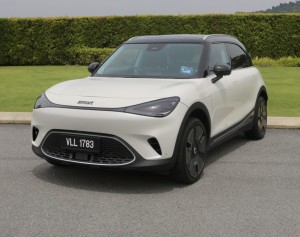Change to car-ownership rights could spur EVs in Singapore
By BLOOMBERG | 03 May 2022
SINGAPORE: The island republic has big ambitions to have 100% of the vehicles on its roads powered by cleaner energy by 2040 and electric vehicles (EVs) will obviously have to be a big part of that.
However, owning a car in the city-state, electric or otherwise, is very expensive.
That’s because when a person buys a new or used car in Singapore, they also have to buy the right to the vehicle ownership for a period of 10 years. It’s called a certificate of entitlement, or COE, and the purpose behind them is to regulate the number of cars on the island.
The price of a COE fluctuates, depending on demand. Auctions are held twice a month and the certificates are divided into five categories depending on engine capacity and vehicle use.
A Tesla Model 3, for example, costs around S$77,990, excluding taxes, in Singapore but a COE for the car is around S$90,002, more than the car itself. A Tesla Model 3 in the US starts at about US$48,190 or S$67,000 by comparison.
That prohibitive expense is reflected in Singapore’s EV adoption rates. Just 2,942 electric cars were registered in the city-state last year, up from 1,217 in 2020 but only a fraction of the total 645,150 cars registered in 2021.
Things could start to change this month, however.
That’s because as of May 4, some EVs will be moved from category B (generally reserved for cars with larger engine capacities) to category A, typically the segment that attracts the lowest COE premiums.
Because electric cars tend to be relatively powerful to compensate for their weighty batteries, even mass-market models were being tipped into the higher category, where bidding from luxury car buyers can also make things more expensive.
Now, instead of paying S$90,002, the COE drops to S$68,699. These prices will again vary at auction but it’s a move authorities in Singapore hope will entice more consumers to make the switch when it comes to replacing their aging combustion engine car.
According to local media reports, the change will double the number of electric models that fall within category A to 20, from 10.
Another issue Singapore needs to tackle in tandem with EV purchase rates is charging infrastructure. Like many other places, a lack of EV chargers is a significant barrier to adoption and a particular problem in densely built up Singapore, where the vast majority of people live in high-rise apartments.
The government has said that all public housing car parks (over 80% of Singaporeans live in public housing, or Housing & Development Board flats) will have at least three EV charging points by 2025.
Charging points are also cropping up in shopping centre car parks and the like, and tenders have been issued to install outlets in private housing, or condominium basements.
There are a raft of other measures too — such as extending the statutory lifespan of electric taxis to 10 years from eight, and pledging that half of public buses will be electric by 2030.
All are instrumental to Singapore’s green goals, but convincing the general public to give EVs a go is a critical step.
Tags
Autos News
Reviews

7.9
Xpeng G6 580 Pro: Fresh and fluidic

Guangzhou adventures: Zontes 368 scooter and 703 Adventure m...

Zontes motorcycle factory in Jiangmen: Running on a fast tra...

7.6
Maserati GranTurismo (Mk2) Modena: Sharp and smooth operator

6.8
Triumph Tiger 900 GT Pro: Multi-talented adventurer

Hyundai Ioniq 5 N: Born rascal

6.6
Husqvarna Svartpilen 401: Inspiring retro design

8.8
smart #1 (Premium): Agile, engaging, roomy, premium motoring
Videos

StarCarSifu Editors' Choice Awards 2024: Top winners

The Snowball – Lamborghini’s Heartwarming Christmas Story of...

EVOGO battery swapping solution showcased at IAA Mobility 20...
